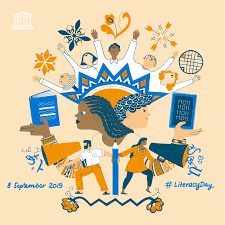International Literacy Day 2019

Adult literacy is defined by the OECD as the ability to identify, understand, interpret, create, communicate and compute, using printed and written materials associated with varying contexts. Literacy involves a continuum of learning in enabling individuals to achieve their goals, to develop their knowledge and potential, and to participate fully in their community and wider society.
The OECD PIAAC study is the only current measure of adult literacy in Ireland. The latest data available is for 2013, with the next set of PIAAC results set to become available in 2023. Although the data is from a number of years ago, it at least provides the basis for discussion of this important issue.
According to the 2013 PIACC study, Ireland is placed 17th out of 24 countries in terms of literacy, with 18 per cent of Irish adults having a literacy level at or below Level 1. People at this level of literacy can understand and follow only basic written instructions and read only very short texts. On numeracy, Ireland is placed 19th out of 24 countries with 26 per cent of Irish adults scoring at or below Level 1. In the final category, problem solving in technology rich environments, 42 per cent of Irish adults scored at or below Level 1.
In other words, a very significant proportion of Ireland’s adult population possesses only very basic literacy, numeracy and information-processing skills, insufficient to compete in a market where the skillsets of even highly-skilled workers are obsolete in a matter of years. Basic literacy skills are required for higher-order skills and ‘learning to learn’ skills, which are necessary for participating and engaging in the economy. Social Justice Ireland welcomed the development of an ‘Upskilling Pathways Plan – New Opportunities for Adults’ included in the Action Plan for Education 2018 aimed at helping adults attain a basic level of literacy, numeracy and digital skills, and calls on Government to provide ambitious targets incorporating all recommendations made by the Council of the European Union in their Recommendation on Upskilling Pathways in 2016.
To this end Social Justice Ireland proposes an additional €30m in Budget 2020 to implement the ‘Upskilling Pathways Plan—New Opportunities for Adults. We also propose an additional investment of €5m in Community Education with a focus on meeting the needs of learners at all levels.

GIVING A VOICE TO THOSE
WHO DON’T HAVE A VOICE
When you support Social Justice Ireland, you are tackling the causes of problems.
